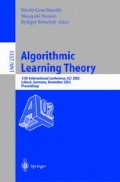Abstract
In this paper we study the learnability of a mixture of lines model which is of great importance in machine vision, computer graphics, and computer aided design applications. The mixture of lines is a partially-probabilistic model for an image composed of line-segments. Observations are generated by choosing one of the lines at random and picking a point at random from the chosen line. Each point is contaminated with some noise whose distribution is unknown, but which is bounded in magnitude. Our goal is to discover efficiently and rather accurately the line-segments that generated the noisy observations. We describe and analyze an efficient probably approximately correct (PAC) algorithm for solving the problem. Our algorithm combines techniques from planar geometry with simple large deviation tools and is simple to implement.
Access this chapter
Tax calculation will be finalised at checkout
Purchases are for personal use only
Preview
Unable to display preview. Download preview PDF.
References
S. Arora and R. Kannan, A polynomial time algorithm to learn a mixture of general gaussians, ACM Symposium on Theory of Computing (STOC), 2001.
S. Arora and S. Khot, Fitting algebraic curves to noisy data, ACM Symposium on Theory of Computing (STOC), 2002.
S. Dasgupta, Learning mixtures of Gaussians, IEEE Symposium on Foundations of Computer Science (FOCS), 1999.
M. Fischler and R. Bolles, Random Sample Consensus: A Paradigm for Model fitting, Communications of the ACM (CACM), 24(5), pp. 381–395, 1981.
D. Forsyth and J. Ponce, Computer Vision-a modern approach, Manuscript, 2002.
D. Haussler, Decision-theoretic generalizations of the PAC model for neural net and other learning applications, Information and Computation, Vol. 100, pp. 78–150, 1992.
P. Roosseeuw, Least Median of Squares Regression, Journal of American Statistical Association, 58, pp. 1–22, 1993.
C. Stewart, Robust Parameter Estimation on Computer Vision, Society for Industrial and Applied Mathematics, SIAM 41(3), pp. 513–537, 1985.
D.M. Titterington, A.F.M. Smith and U.E. Makov, Statistical Analysis of Finite Mixture Distributions, John Wiley & Sons, 1985.
Author information
Authors and Affiliations
Editor information
Editors and Affiliations
Rights and permissions
Copyright information
© 2002 Springer-Verlag Berlin Heidelberg
About this paper
Cite this paper
Dasgupta, S., Pavlov, E., Singer, Y. (2002). An Efficient PAC Algorithm for Reconstructing a Mixture of Lines. In: Cesa-Bianchi, N., Numao, M., Reischuk, R. (eds) Algorithmic Learning Theory. ALT 2002. Lecture Notes in Computer Science(), vol 2533. Springer, Berlin, Heidelberg. https://doi.org/10.1007/3-540-36169-3_28
Download citation
DOI: https://doi.org/10.1007/3-540-36169-3_28
Published:
Publisher Name: Springer, Berlin, Heidelberg
Print ISBN: 978-3-540-00170-6
Online ISBN: 978-3-540-36169-5
eBook Packages: Springer Book Archive

